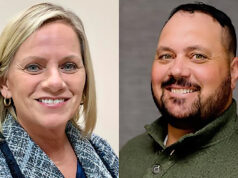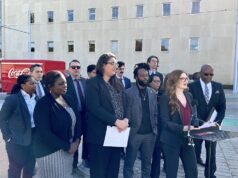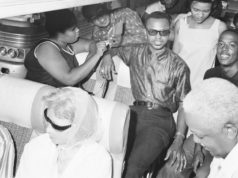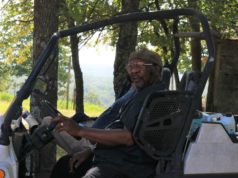There is something about buying a pregnancy test from Dollar Tree that makes you value life a little differently. Only a few days prior, one of my 17-year-old students told me her period was missing, and she had no idea who to tell.
I wish I could say her story was an exceptional case in a mass of privileged students I work with at a local afterschool program. A large number of the students in the program are African American and live within unique, marginalized experiences. Every single day has the potential to be a struggle, even for me just to bear witness.
An impromptu presentation
One day, the boys and girls were directed to split into two different rooms. Guest speakers were scheduled to speak to the girls but had not arrived. The program coordinator asked me to lead a dialogue about bullying and abuse, and I agreed.
I opened by asking the girls to identify different types of abuse. They mentioned mental, physical, verbal and even cyber bullying. Giggling within their own conversations, afterschool staff worked to eliminate the extra chatter. I kept speaking, hoping the direction of my dialogue would create itself.
I finally asked, “What do you do if you know someone who is being abused or bullied?”
Tondalao Hall and failure-to-protect laws
Failure-to-protect laws were designed to safeguard children in the event they experience interpersonal violence — placing duty on any knowledgeable adult to take all necessary measures to protect the child. I informed the girls that, as educators, if we knew or suspected violence to any child, we would be obligated to protect them by reporting the violation.
The girls were then challenged to be responsible for themselves, each other and to take leadership roles when they witnessed abusive behavior, especially bullying.
I told them about the case of Tondalao Hall and how she was only in junior high when she became pregnant with her first child. A few years later, she became pregnant with a second and a third child by a different man.
Although fearful of having kids taken into DHS custody, Hall hesitantly took her children to the hospital for suspected injuries after hearing continuous crying from her two youngest babies. To her surprise and confirmation, both she and her partner, Robert Braxton, were arrested, and her children were taken by the state. Braxton was later found guilty of breaking the children’s toes, femurs and ribcages. Although his abusive behavior toward Hall was mentioned in court, the judge dismissed the details as irrelevant.
After issuing a guilty plea, the convicted abuser walked away a free man with only eight years probation. Hall, however, was charged with “failure to protect” and sentenced to 30 years total, 10 of which she has already served. She did not know what abuse looked like, nor did she feel empowered to speak out against it, and it cost her her freedom and the safety of her children.
White privilege blind to intersectional lens
I asked the female students to imagine if someone had spoken up on Hall’s behalf. You could hear jaws dropping in the room — a foreign experience to a group usually dabbing and yelling within inches of their neighbor’s ear.
Now they were listening attentively. In single shouts, questions began ringing out from different sides of the room. Hall’s story was real and tangible, and they wanted to know how was it even possible for the system to fail a survivor so completely.
Then, the day’s actual presenters arrived. Three white women opened their dialogue by introducing a card game. If you had the lowest card from the deck, they requested to know how it made the girls feel. The presenters spoke to the girls as if they were actual 12-year-olds who, in any alternate dimension of society, would only have had experience with delightful, naïve 12-year-old things.
But these girls were survivors. Every day.
The entire room shifted, the students stopped listening, and the energy took a wicked tailspin. The girls disengaged. The staff became anxious and frustrated but opted to watch the crash happen.
Realizing I was witnessing a tragedy that I have seen too often, I cringed. Well-intentioned white people who truly seek to make a positive impact in a community desperate of nurturing enter into a space as an “ally,” ambition blazing. Unfortunately, these same people only exemplify how white privilege refuses to invest in an intersectional lens of race and gender to understand how certain vulnerabilities affect communities differently.
They simply didn’t get it.
Mixed emotions
Part of me believes that the presenters provided the best facilitation they were capable of, dismissing their lack of substance or depth for the intentional need of creating a generic template capable of being administered to any youth audience. Plus, they had no idea I had been leading a “scared-straight” training just before their arrival.
Part of me also believes the presenters provided a true reflection of their actual depth. In which case, white-led organizations should seek consult as to how white supremacy, gender, class, sex and racism affect the communities they claim to serve.
Another part of me believed that, even if the presenters had had more depth, they made the best decision to not customize their message by staying in their lane and allowing more culturally competent folks to address the meatier conversations.
Part of me believes that with the upcoming Trump administration, I no longer have time to shuck and jive around white fragility.
Every single organization seeking to influence our society should take more deliberate steps toward inclusivity when crafting its mission, education and platform by ensuring that advocacy, in any form, works from the margins outward and not the other way around.
Results are in
Tapping my toe against the cold tile floor, the 17-year-old and I anxiously watched one line appear on the pregnancy test. She was not pregnant. She didn’t cry.
Ironically, I was required to report the incident to be in accordance with failure-to-protect laws based on the compromising circumstance surrounding her sexual encounter.
The next day, I asked her if she wanted to play spades with the deck of cards the presenters had left.
“Nah, I’m good,” she said. “But you got dominoes?”






















